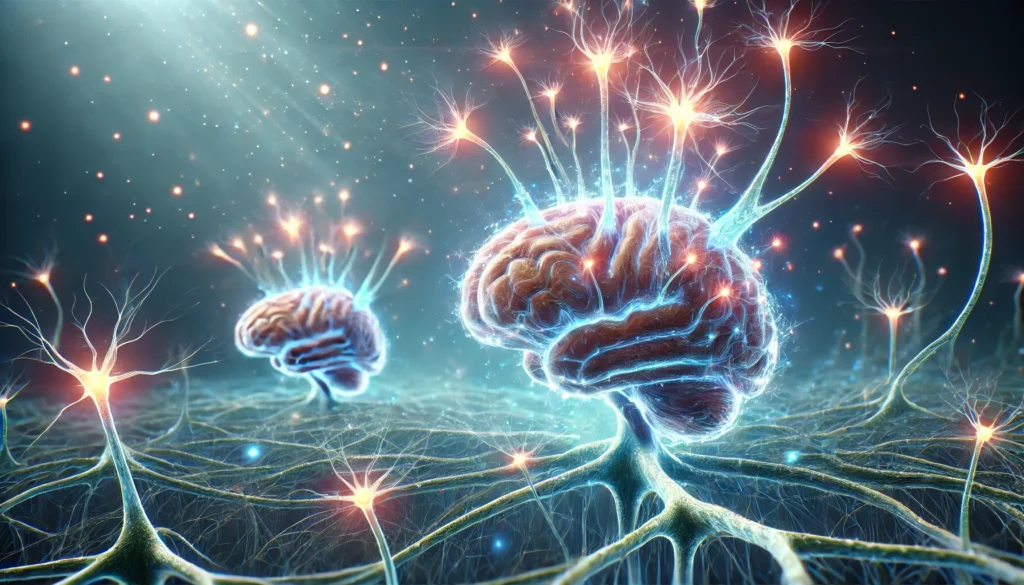The human brain is one of the most intricate and sophisticated organs in existence, housing a vast network of neurons that facilitate every thought, movement, and emotion. The number of neurons in the human brain plays a pivotal role in cognitive function, memory retention, and overall brain health. As research continues to advance, scientists are uncovering new insights into how neuronal density affects longevity and cognitive enhancement. Understanding how many brain cells the average human has and how these cells function can offer valuable knowledge about maintaining cognitive vitality and preventing neurodegenerative diseases.
You may also like : Best Things for Brain Health: Expert-Backed Strategies to Keep Your Mind Sharp
The Complex Structure of Brain Neurons
The brain is composed of billions of neurons, each responsible for transmitting electrical and chemical signals throughout the nervous system. These neurons, also referred to as human brain nerve cells, form intricate networks that allow for the processing of sensory information, motor control, and higher cognitive functions. While early estimates suggested that the human brain contained approximately 100 billion neurons, more recent studies have revised this number to around 86 billion. This revision was made possible through advancements in neuroimaging and cell-counting techniques, providing a more accurate assessment of the amount of neurons in the brain.
The Role of Neurons in Cognitive Health
Cognitive health is directly influenced by the integrity and functionality of neurons. Neurons in the human brain communicate through synapses, where neurotransmitters are released to transmit signals from one cell to another. The efficiency of these processes determines cognitive abilities such as learning, problem-solving, and decision-making. When neurons are damaged or lost due to aging, neurotoxicity, or disease, cognitive decline can occur. However, neuroplasticity—the brain’s ability to reorganize and form new neural connections—demonstrates that cognitive health can be preserved and even enhanced through lifestyle choices and cognitive training exercises.

How Many Brain Cells Does the Average Human Have?
The number of neurons in the brain is not uniform across all individuals. Factors such as genetics, environmental influences, and lifestyle choices can impact neuronal density. Studies have shown that an average adult human brain contains approximately 86 billion neurons, but this number can vary slightly from person to person. Moreover, while some brain regions, such as the cerebral cortex, contain densely packed neurons responsible for complex thought and decision-making, other areas, like the cerebellum, house a higher number of neurons dedicated to motor coordination. Understanding the specific distribution of brain cells offers valuable insights into how different brain functions are regulated.
The Impact of Aging on Neuronal Density
As individuals age, the natural process of neuronal loss occurs, albeit at a gradual rate. The decline in brain neurons is associated with reduced cognitive function, memory impairment, and an increased risk of neurodegenerative disorders like Alzheimer’s disease. However, research has shown that engaging in cognitive activities, maintaining a balanced diet rich in antioxidants, and exercising regularly can slow down neuronal loss. Certain lifestyle habits, such as reducing stress and getting adequate sleep, also contribute to preserving brain health and promoting longevity.
Neuronal Regeneration and Neurogenesis
One of the most groundbreaking discoveries in neuroscience is the concept of neurogenesis—the ability of the brain to generate new neurons throughout life. While it was once believed that neuronal growth ceased after early development, studies now indicate that specific regions of the brain, such as the hippocampus, continue to produce new neurons even in adulthood. This finding has significant implications for cognitive enhancement and neurodegenerative disease prevention. Encouraging neurogenesis through brain-stimulating activities, proper nutrition, and mindfulness practices can help sustain cognitive function and improve mental resilience.
How Many Nerve Cells Does the Brain Have Compared to Other Species?
When comparing the human brain to those of other species, it becomes evident that neuronal density is a critical factor in cognitive abilities. While some animals, such as elephants and whales, have larger brains than humans, their neuronal density is often lower in regions responsible for higher-order thinking. The unique organization of human brain neurons allows for advanced reasoning, abstract thought, and problem-solving skills that distinguish humans from other species. This intricate neural wiring underscores the importance of maintaining brain health to optimize cognitive function throughout life.

The Relationship Between Brain Health and Longevity
Longevity is closely linked to brain health, as cognitive decline is one of the leading factors affecting quality of life in aging populations. Studies indicate that individuals who engage in intellectually stimulating activities, maintain social connections, and adopt healthy lifestyle habits tend to experience slower cognitive decline and increased lifespan. The number of neurons in the brain plays a significant role in determining cognitive resilience, and strategies that support neuronal preservation, such as meditation, physical activity, and a nutrient-rich diet, can contribute to longevity.
Strategies to Protect Brain Cells and Enhance Cognitive Function
To preserve the number of neurons in the brain and optimize cognitive health, several key strategies should be adopted. First, consuming a diet rich in omega-3 fatty acids, antioxidants, and essential vitamins supports neuronal function and reduces inflammation. Foods such as fatty fish, blueberries, and leafy greens have been shown to enhance brain health. Second, engaging in regular physical exercise promotes blood flow to the brain, which is essential for delivering oxygen and nutrients to neurons. Lastly, lifelong learning, problem-solving activities, and mindfulness practices have been proven to strengthen neural networks and enhance memory retention.
Frequently Asked Questions (FAQ) on Neurons in the Human Brain
1. How do neurons in the human brain communicate with each other?
Neurons in the human brain communicate through an intricate process involving electrical and chemical signals. Each neuron is composed of a cell body, dendrites, and an axon, which work together to transmit information. Electrical impulses, known as action potentials, travel down the axon to the synapse, where neurotransmitters are released to bridge the gap between neurons. These neurotransmitters bind to receptors on the receiving neuron, triggering further electrical impulses. This seamless communication allows the brain to process sensory information, control motor functions, and regulate emotions with remarkable efficiency.
2. Can the number of neurons in the brain change over time?
Yes, the number of neurons in the brain can change due to various factors such as aging, neuroplasticity, and neurogenesis. While some neuronal loss is a natural part of aging, research suggests that new neurons can still form in specific brain regions, such as the hippocampus. Lifestyle factors like physical exercise, cognitive stimulation, and a healthy diet have been shown to support neuronal growth. Additionally, stress and neurodegenerative diseases can accelerate neuronal loss, highlighting the importance of maintaining brain health. Understanding how many brain cells the human brain has and how they evolve can provide valuable insights into preserving cognitive function.
3. How does neuronal density affect intelligence and cognitive abilities? Neuronal density plays a critical role in intelligence and cognitive performance, but it is not the sole determinant. The organization and connectivity of neurons, as well as the efficiency of synaptic transmission, significantly impact intellectual abilities. Some studies suggest that individuals with a higher number of neurons in the brain may have greater cognitive potential, but other factors like experience, education, and environment also influence intelligence. Brain plasticity, or the ability to form new neural connections, allows individuals to enhance their cognitive abilities through learning and practice. Therefore, while neuronal count is important, cognitive function depends on a combination of structural, genetic, and environmental factors.
4. How many brain cells does the average human have at birth compared to adulthood?
At birth, the human brain contains approximately 100 billion neurons, but this number declines slightly as it matures. During early development, synaptic pruning occurs, where unnecessary or weak connections are eliminated to optimize neural networks. By adulthood, the number of neurons in the brain stabilizes at around 86 billion. However, the efficiency of neuronal communication improves through experience and learning. This process allows for increased cognitive efficiency, even if the total neuronal count decreases slightly over time.
5. Do all brain neurons serve the same function?
No, different types of neurons serve specialized functions within the brain. Sensory neurons process external stimuli such as sight, sound, and touch, while motor neurons control movement by transmitting signals to muscles. Interneurons play a crucial role in integrating information and coordinating responses within neural circuits. Additionally, some neurons are involved in higher cognitive processes such as memory, emotion, and decision-making. This specialization ensures that the human brain nerve cells work together harmoniously to regulate all aspects of behavior and physiology.
6. How do lifestyle choices impact the amount of neurons in the brain? Lifestyle choices significantly influence brain health and neuronal preservation. Engaging in regular physical exercise has been shown to promote neurogenesis, particularly in the hippocampus, a region critical for memory. A diet rich in antioxidants, omega-3 fatty acids, and essential vitamins supports neuronal function and reduces oxidative stress. Chronic stress and poor sleep, on the other hand, can lead to neuronal damage and cognitive decline. Cognitive activities such as reading, learning new skills, and social engagement also help maintain brain plasticity, allowing individuals to retain and even improve cognitive function as they age.
7. What are the effects of neurodegenerative diseases on brain cells? Neurodegenerative diseases such as Alzheimer’s, Parkinson’s, and Huntington’s disease lead to the progressive loss of neurons and synaptic connections. These conditions disrupt normal brain function, resulting in memory impairment, motor difficulties, and cognitive decline. Research suggests that early intervention, including lifestyle modifications and medical treatments, can slow disease progression and preserve cognitive abilities. Understanding how many nerve cells the brain has and how they are affected by disease can aid in developing targeted therapies. Advances in neuroscience continue to explore potential treatments that may help regenerate neurons and restore brain function.
8. Can the brain adapt to neuronal loss?
Yes, the brain exhibits remarkable adaptability in response to neuronal loss through a process known as neuroplasticity. When neurons are damaged or lost due to injury, disease, or aging, the brain compensates by strengthening existing neural pathways or forming new ones. This adaptability is particularly evident in stroke recovery, where patients often regain lost functions through rehabilitation and therapy. Learning new skills, engaging in problem-solving activities, and maintaining a stimulating environment can enhance neuroplasticity. This ability highlights the resilience of the human brain nerve cells and their capacity to reorganize and maintain cognitive function.
9. How does sleep affect the number of neurons in the brain?
Sleep plays a crucial role in neuronal health, supporting memory consolidation, synaptic repair, and toxin removal. During deep sleep, the brain undergoes a process known as synaptic homeostasis, where weak synaptic connections are pruned, and strong ones are reinforced. Sleep deprivation has been shown to impair neuronal function, reduce cognitive performance, and increase the risk of neurodegenerative diseases. Furthermore, chronic lack of sleep may accelerate neuronal loss, highlighting the importance of maintaining healthy sleep habits. Ensuring adequate rest can support the amount of neurons in the brain and promote long-term cognitive well-being.
10. What future research is being conducted on brain neurons and longevity? Ongoing research continues to explore how the brain neurons influence longevity and cognitive health. Scientists are investigating potential therapies that may enhance neurogenesis, including stem cell treatments, gene editing, and neurotrophic factors that promote neuronal growth. Advances in artificial intelligence and neurotechnology are also paving the way for brain-computer interfaces that could help restore lost cognitive functions. Understanding how many brain cells the average human has and how they change over time is critical for developing interventions that may delay cognitive decline. As neuroscience advances, new strategies for preserving brain health and extending lifespan are likely to emerge.

Conclusion: Unlocking the Potential of the Human Brain
Understanding how many brain cells the human brain has and the role they play in cognitive function is essential for maintaining mental acuity and promoting longevity. The intricate network of brain neurons facilitates thought, memory, and decision-making, making it crucial to adopt lifestyle habits that support neuronal health. By embracing strategies that encourage neurogenesis, reduce cognitive decline, and optimize brain function, individuals can unlock the full potential of their minds, ensuring a sharper intellect and a longer, healthier life.
brain function optimization, neural connectivity, cognitive enhancement techniques, brain plasticity research, neurogenesis and memory, brain aging process, neurological health tips, mental clarity strategies, cognitive resilience, brain repair mechanisms, neuron regeneration, brain exercise benefits, improving brain efficiency, brain health supplements, neuroprotection strategies, memory retention methods, cognitive longevity, brainwave activity, advanced neuroscience research, mind-body connection
Further Reading:
It Takes the World to Understand the Brain
Understanding the human brain: insights from comparative biology
A review on the complexities of brain activity: insights from nonlinear dynamics in neuroscience
Disclaimer
The information contained in this article is provided for general informational purposes only and is not intended to serve as medical, legal, or professional advice. While Health11News strives to present accurate, up-to-date, and reliable content, no warranty or guarantee, expressed or implied, is made regarding the completeness, accuracy, or adequacy of the information provided. Readers are strongly advised to seek the guidance of a qualified healthcare provider or other relevant professionals before acting on any information contained in this article. Health11News, its authors, editors, and contributors expressly disclaim any liability for any damages, losses, or consequences arising directly or indirectly from the use, interpretation, or reliance on any information presented herein. The views and opinions expressed in this article are those of the author(s) and do not necessarily reflect the official policies or positions of Health11News.


